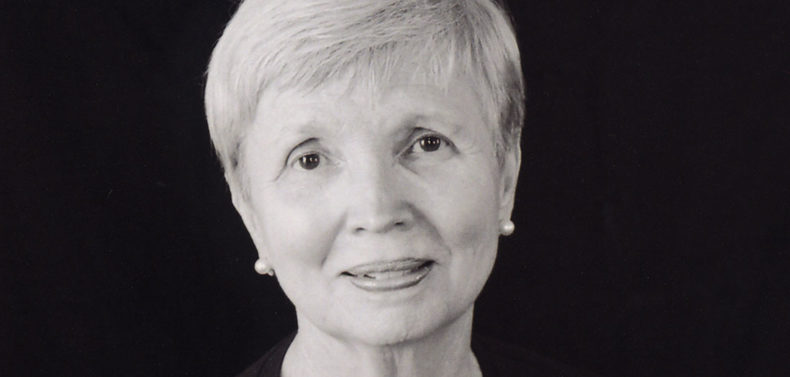Editor’s Note: John Inscoe is UGA’s Albert B. Saye Professor Emeritus of History.
It is hard to believe that the inimitable Peggy Galis will celebrate her 80th birthday this week. To help confirm this reality and in recognition of all she has contributed—and continues to contribute—to the Athens community, Mayor Kelly Girtz has declared that momentous date of May 26 to be “Peggy Galis Day.”
A native of Elberton, Peggy Heard became an Athenian during four years as a UGA student in the early 1960s, and marriage to a young local lawyer, Denny Galis, made her a long-term resident. They’ve raised two sons here and are now helping to raise two very fortunate grandchildren.
Peggy’s energy, enthusiasm and engagement on multiple fronts are just as evident now as they’ve been since I first came to know her 40 years ago. She’s remarkably well versed on a vast range of topics encompassing state and local history and on Southern literature more broadly. (She used to attend annual Faulkner conferences in Oxford, MS.) She’s long been a valuable board member and fervent champion of, among others, the Georgia Humanities Council, the UGA Press, the Athens Historical Society, the Georgia Writers Hall of Fame and the Georgia Women of Achievement.
Peggy worked closely with Dale Couch of the Georgia Museum of Art to establish the Henry D. Green Symposium for Decorative Arts, which first convened in 2002 and has met every third year since. According to Couch, Peggy “shaped the intellectual dimensions of the event by her command of Georgia history and her multiple scholarly connections.” Equally valuable was her creation of a distinctive social ambience to the symposia by encouraging Athenians to open their homes to out-of-town attendees. She and Denny have long set an example in making their beautiful home the site for lively gatherings of all sorts.
The UGA History Department has long been a beneficiary of the Galises’ hospitality and generosity. Until COVID, Peggy hosted receptions or dinners for our first-year graduate students, which sent good vibes at the beginning of each school year, as well as for distinguished visiting speakers and for faculty members with special achievements to celebrate. A summer apprenticeship for UGA history PhD students at the UGA Press is endowed in Peggy’s honor.
One of my favorite examples of both Peggy’s generosity and her curiosity lies in her attention to individual students. She has been known to strike up discussions with students sitting near her on a campus bus or at a public lecture and was often intrigued enough to link them up with a faculty member whom she thought the student would benefit from knowing, and brought the two together over lunch or a visit on her front porch.
Peggy has long committed her time and talents to the Clarke County schools, at no time more so than now. She’s long arranged for prominent speakers at UGA—such as Ernest Gaines, Alice Walker and, just last month, Natasha Trethewey—to also give talks at Clarke Central High School while they were in town.
A year ago, Peggy established a K-12 Committee through the Athens Historical Society to seek out innovative ways in which teachers at all grade levels can embrace local history as part of the social studies curriculum. Partnering with the equally dynamic history professor Cindy Hahamovich, the twosome is already well into an ambitious project, in which they have Hahamovich’s students producing a series of short films documenting local history, as a way for teachers to incorporate Athens’ past into their courses.
At the same time, this high-octane octogenarian is collaborating with another distinguished UGA historian, James Brooks, on a new experimental course he will teach in the fall. Called “Indigenous Athens,” the course taps into one of Peggy’s foremost areas of interest—the shifting presence of Creek Indians in this area, known as the Oconee Plateau, during the late 18th and early 19th centuries. The ultimate goal of the project is to develop a proposal to Historic Athens for a public interpretive plan that it will adopt over time.
This honor is not the first to pay tribute to all Peggy does; she was the recipient of the Governor’s Award in the Humanities in 2005. Who could have predicted that her record of service would have expanded so greatly as she approaches her 80th birthday? With no sign of resting on her laurels, that energy, enthusiasm, engagement and expertise remain in full force and show no sign of waning anytime soon.
UGA Press Director Lisa Bayer related her favorite anecdote about Peggy: “Several years ago the Galises and I were walking through the Atlanta History Center, with Peggy a few steps ahead. She kept darting here and there, talking to people, reading exhibit signage, examining objects more closely. Denny said drolly, ‘Peggy Galis has never walked a straight line in her life.’”
Bayer concluded by stating that she’s tried to live by that principle ever since. As should we all!
Like what you just read? Support Flagpole by making a donation today. Every dollar you give helps fund our ongoing mission to provide Athens with quality, independent journalism.





